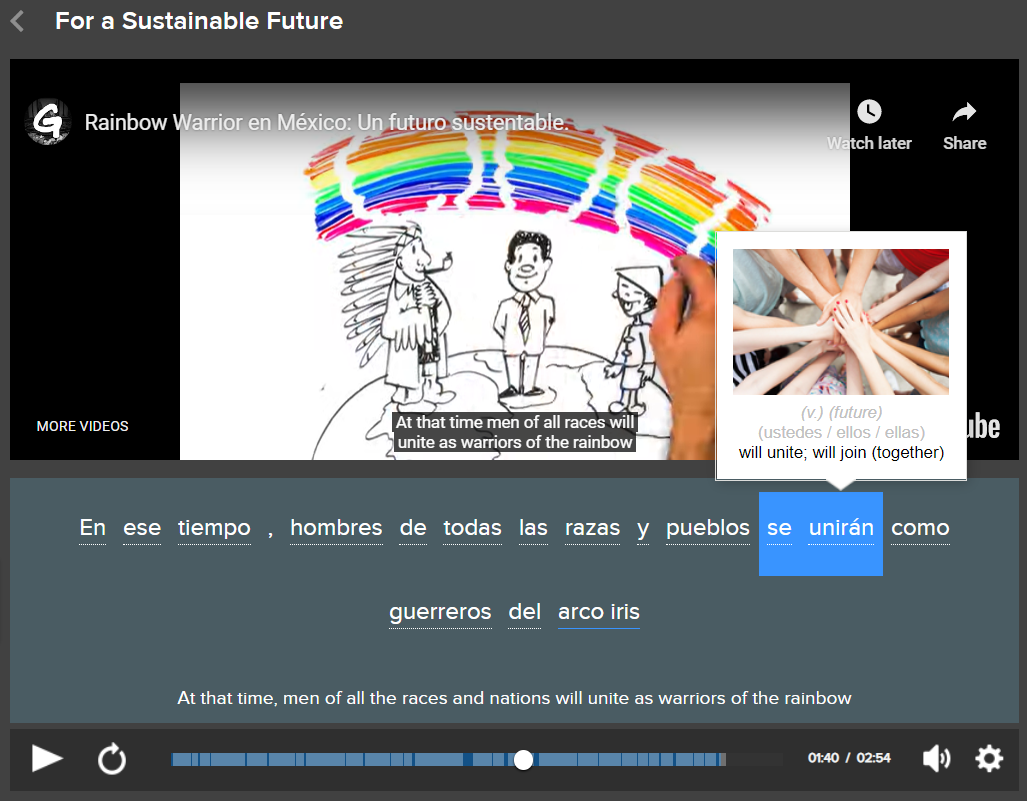
[ad_1]

So you possibly can discuss the current in Spanish, you’ve lastly acquired your head across the previous tenses too, so now there’s just one method ahead—and it might trigger flashbacks from highschool Spanish.
So let’s return… to the long run!
And sure, I did simply add that final bit in so I might use the phrase “Again to the Future,” but it surely was completely price it.
On this publish, you’ll study every part you want to know in regards to the future tense in Spanish—conjugations, when to make use of it, irregular verbs and extra.
Contents
Obtain:
This weblog publish is on the market as a handy and transportable PDF that you simply
can take anyplace.
Click on right here to get a duplicate. (Obtain)
Spanish Future Tense
The longer term tense in Spanish is very like “will” in English. We use it to make predictions in regards to the future, assumptions or guesses in regards to the current and provides instructions.
For instance:
Lloverá mañana. (It should rain tomorrow.)
Estará en la cama. (He’ll be in mattress.)
¡Callarás! (You’ll/shall be quiet!)
Most significantly, we additionally use it to speak in regards to the distant future. So if you wish to discuss subsequent 12 months’s trip, you’ll say:
El año que viene iremos a Nueva York (Subsequent 12 months we’re going to New York)
Future Tense Conjugation
Once we discuss “the long run kind” in Spanish, we seek advice from the long run easy tense.
To kind the long run tense in Spanish, we have to take the infinitive type of the verb and add these endings to it: -é, -ás, -á, -emos, -éis and -án. Every ending corresponds to a special topic, and are the identical whether or not you’re utilizing an –ar, –er, or –ir verb.
Notice that there’s an accent on the primary letter of each ending, besides the “we” kind –emos.
| Topic | Endings | Instance Utilizing Hablar |
|---|---|---|
| Yo | -é | Hablaré |
| Tú | -ás | Hablarás |
| Él/Ella/Usted | -á | Hablará |
| Nosotros | -emos | Hablaremos |
| Vosotros | -éis | Hablaréis |
| Ellos/Ellas/Ustedes | -án | Hablarán |
Irregular Verbs in Future Tense
Some verbs are irregular and don’t comply with precisely the identical sample as above: although they use the identical endings because the common verbs, the stems will change.
Listed here are some frequent irregular verbs which are price studying:
| Infinitive Verb | Irregular Future Type |
|---|---|
| Tener | Tendré |
| Poner | Pondré |
| Decir | Diré |
| Querer | Querré |
| Hacer | Haré |
| Venir | Vendré |
| Saber | Sabré |
Different Makes use of of the Future Tense
“If” statements. The easy future tense is often utilized in “if” statements. For instance:
Si tengo dinero suficiente, iré de compras contigo. — If I find the money for, I’ll buy groceries with you.
Si tú te vas, el dolor me comerá. — In the event you depart, the ache will devour (lit. eat) me. (It is a line from an Enrique Iglesias music!)
Speaking in regards to the previous and current. Consider it or not, you possibly can generally use the long run tense to speak in regards to the previous and current! Extra particularly, it’s used to precise risk and chance about an motion that’s occurring proper now. For instance:
¿Adónde habrá ido Mary? — The place might Mary have gone/The place has Mary gone?
Ella estará estudiando ahora. — She might be finding out proper now/She will likely be finding out proper now.
Reported speech. You’ll regularly hear the Spanish future tense in reported speech—like information clips, information articles, newspapers and extra. For instance:
Serán las cinco y media cuando llegue el presidente. — It will likely be 5:30 when the president arrives.
Habrán sido 100 años desde la muerte del guerrero. — It should have been 100 years for the reason that loss of life of the warrior.
Extra Spanish Future Varieties
Ir + A + Infinitive Future Type
Similar to in English, we use the phrase “going to” when speaking about issues we’ve got already deliberate which are usually within the close to future.
Vamos a ir de compras. (We’re going buying.)
Voy a viajar a Guatemala. (I’m going to journey to Guatemala.)
So how can we make the Spanish equal of “going to?”
It takes a easy system:
Ir + a + infinitive
Right here’s an instance of the system in motion, utilizing hablar (to speak) for example:
| Topic | Ir Conjugations | Ir + A + Infinitive |
|---|---|---|
| Yo | Voy | Voy a hablar |
| Tú | Vas | Vas a hablar |
| Él/Ella/Usted | Va | Va a hablar |
| Nosotros | Vamos | Vamos a hablar |
| Vosotros | Vais | Vais a hablar |
| Ellos/Ellas/Ustedes | Van | Van a hablar |
So long as you utilize the ir + a, you should utilize this with the infinitive of any verb.
Utilizing Current Tense
You could not understand it, however we use the current to speak in regards to the future on a regular basis in English. Take into consideration what you’ll say if I requested what time you had been leaving the home tomorrow.
You’d possible say “I’m leaving at eight” as an alternative of “I’m going to depart at eight” or “I’ll depart at eight.”
It’s related in Spanish, although they have an inclination to make use of the easy current tense as an alternative of the current steady tense that we normally use in English.
Salgo a las ocho. (I’m leaving at eight.)
Use the current tense to speak in regards to the future in Spanish anytime you’ll in English, normally when somebody asks you within the current about one thing you’re planning on doing.
Future Good
That is used once you wish to discuss one thing that hasn’t occurred but however will.
For this, you want to use the future indicative type of haber plus the previous participle.
You may create the previous participle of a verb by dropping the –ar, -er or -ir ending and including -ado for ar verbs or -ido for er and ir verbs.
Here’s what that may seem like utilizing hablar for example:
| Topic | Future Good |
|---|---|
| Yo | Habré hablado |
| Tú | Habrás hablado |
| Él/Ella/Usted | Habrá hablado |
| Nosotros | Habremos hablado |
| Vosotros | Habréis hablado |
| Ellos/Ellas/Ustedes | Habrán hablado |
Listed here are some examples of the long run excellent in use:
Habremos terminado antes de que llegue. (We may have completed earlier than he arrives.)
Habré ido a la universidad. (I’d have gone to school.)
Helpful Spanish Future Vocabulary
Listed here are some phrases it is best to know if you wish to discuss future plans:
How one can Apply the Spanish Future Tense
There are many assets on the market that will help you follow Spanish grammar, together with the long run tenses. There are workout routines on the net in addition to Spanish grammar apps that will help you study and evaluate.
However one of the simplest ways to drill these into your thoughts is to see how native audio system use them: Possibly you’ll find a Spanish-language TV collection about time journey, or simply discover a copy of The Time Machine in Spanish. No matter you do, be careful for the way these verbs are conjugated!
You may additionally use a web based immersion program. FluentU, for instance, takes brief movies about many alternative subjects (overlaying the previous, current, and sure, future) and provides annotated subtitles for immediate definitions and extra content material for unfamiliar phrases.
You need to use FluentU on iOS, Android and the web site.
The extra assets you utilize, the extra grammar you’ll be uncovered to. The longer term tense comes up in tons of conversations and listening to it utilized in context will make it easier to keep in mind it higher.
There you’ve it—the complete rundown of the long run tense in Spanish, from conjugations to irregularities.
We hope that la próxima vez (the subsequent time) you wish to speak in regards to the futuro (future), you’ll don’t have any issues in any respect.
¡Hasta la próxima! (See you subsequent time!)
Obtain:
This weblog publish is on the market as a handy and transportable PDF that you simply
can take anyplace.
Click on right here to get a duplicate. (Obtain)
[ad_2]
